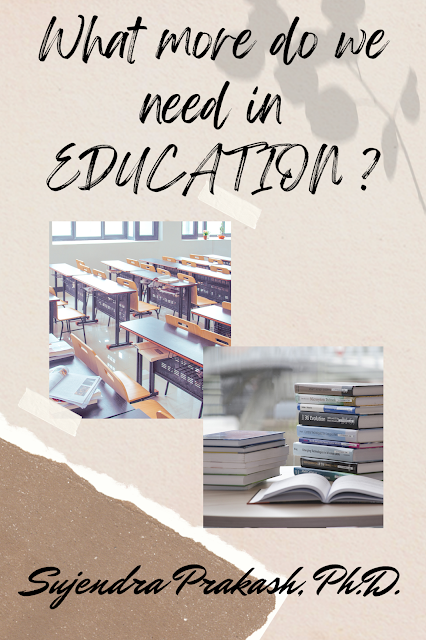 |
| Photo by Artem Podrez from Pexels |
Holistic Development in Children
INTRODUCTION
An individual’s life span comprises four major thrust areas of development.
From conception to about eight years, the cognitive
development in the child is very important. Parents need to
provide adequate stimulation for the child to nurture creativity, thinking and
reasoning, problem-solving ability, perceptual acuity, perceptual learning,
intelligence, and memory.
From eight years to adulthood educational development should
take place. Parents, teachers, specialists, and society should work for the
holistic development of the individual during this period.
Vocational development takes place during adulthood
and middle age. Here, one has to develop and use the skills necessary to deal
with life and should derive contentment from one’s work. The idea of
contentment involves minimum discomfort to oneself and others.
The later age is typically manifested by spiritual development where one’s interest is in trying to reach higher goals of satisfaction and contentment.
COGNITIVE AND EDUCATIONAL DEVELOPMENT
Education forms a significant part of life that determines future
adjustment. Therefore, it is necessary to deal with it in greater detail.
Unlike the present scenario where education has permeated into mere marks
scoring exercise, the essence of holistic development is found in the following
major life skills.
1. Study Involvement
2. Cognitive Abilities
3. Intellectual Capacity
4. Personality Development
5. Need Fulfilment
6. Emotional Balance
8. Social Maturity and
9. Moral Development
1. Study Involvement
Educational psychologists identify
several psychological and social factors contributing to the academic
achievement of the students. One important variable reflecting the internal
processes and influencing the efficiency with which a student is capable of
handling the stressors in the educational environment is his/her involvement in
studies. Study involvement is positively related to academic achievement. Following
dimensions make up for the 'study involvement' in students:
·
Interest in Studies
·
Study Habits
·
Classroom Behavior
·
Library Work
·
Career Orientation
·
Extracurricular Activities
·
Co-curricular Activities
·
General Knowledge
·
Study Orientation
·
Attitude towards Study and
·
Overcoming Exam Fear
2. Cognitive Abilities
Human beings are endowed with a
highly developed cerebral cortex in the brain. Functionally, the cortex has
specific areas involved in carrying out day-to-day activities. The Motor area controls
body movements and the Sensory area receives sensory impulses from the body.
The finer differentiation of perceptual inputs is done for vision in the visual
area and hearing in the auditory area. Our major focus lies in the Language
areas and Association areas of the brain, which are responsible for higher
mental functions. The development of cognitive abilities depends upon the
extent to which these areas are stimulated and nurtured during the life span of
the individual.
Cognitive Abilities Include
·
Speed-Reading
·
Attention & Concentration
·
Skill Learning
·
Efficient Memory
·
Perceptual Skills
·
Aptitudes and
· Hobbies and Interests
3. Intellectual Capacity
While IQ measurement has become outdated,
we need to look at the different ways in which the intelligence of a person is
used. According to David Wechsler (1944), “Intelligence is the aggregate or
global capacity of the individual to act purposefully, to think rationally and
to deal effectively with his environment”. Its growth is similar to that of
height. A considerable increase is found in the first five years followed by a
steady rate of growth until one reaches the age of around 18 to 21 years. By
the end of this period very little can be done to increase intelligence. Hence,
intellectual capacity should be nurtured in schools and colleges. Though
heredity plays an important role in intellectual development, an enriched
environment can overrule the effects of inheritance at least to some extent.
The following abilities are
considered under intellectual capacity:
·
Verbal Ability
·
Numerical Ability
·
Comprehension
·
Abstract Reasoning
·
Logical Reasoning
·
Performance Intelligence
·
Analytical Ability and
· Spatial Relations
4. Personality Development
There is a great misuse of the word
personality by people simply because they feel that anything can be included
under it. However, personality refers to certain characteristic traits of an
individual that determine considerable consistency in behavior. The shaping of
personality occurs over a period, by collating one’s own experiences. Rather
than trying to develop a few skills, we must stress about an individual’s
effective capability to adjust with oneself, the environment, and the
interaction between the two.
Personality development includes the
following aspects:
·
Frustration Tolerance
·
Psychological Well Being
·
Social Adjustment
·
Locus of Control and
· Realistic Approach
5. Need Fulfilment
A log of wood would be no different
from a human being if not for the needs that gear us up towards fulfillment and
satisfaction. However, the cyclical process of motivation does not end in
itself. The need should be strong, the drive must be forceful, and the
satisfaction ought to be complete.
Need fulfillment takes into
consideration the following dimensions:
·
Aspiration
·
Achievement
·
Cooperation
·
Competition
·
Autonomy
·
Self-Esteem and
· Self-Actualization
6. Emotional Balance
We keep learning several emotions as
we grow up but we know very little about what to do with them. Negative
emotions like anger and fear override our capabilities. Aggression, depression,
and suicide have hazardous consequences. Over a while, negative emotions and
unfulfilled desires affect our body, too, and we have greater chances of
developing psycho-physiological disorders like peptic ulcer, hypertension,
bronchial asthma, migraine and tension headaches, heart problems, and also
diabetes.
It is necessary to cater to the
following sub-areas to maintain emotional balance:
·
Overcoming Loneliness
·
Restlessness
·
Helplessness
·
Emotional Regulation
·
Self-Confidence and
· Emotional Intelligence
7. Communication Skills
Our interaction with the environment
determines our effectiveness in whatever we do. Communication does not simply
mean public speaking. It indicates how well we can organize our thoughts,
feelings, and perceptions and get across them to others around us.
Simultaneously, it involves how receptive we are to others’ internal
behavior.
The development of the following
skills is necessary for effective communication:
·
Listening Skills
·
Reading Ability
·
Writing Ability
·
Human Relations
·
Verbal Communication
·
Nonverbal Communication and
· Overcoming Stage Fear
8. Social Maturity
Being members of society, we place
ourselves in the “web of social relationships”. Our level of maturity
determines how well we are influenced by others and how well we influence
others.
The following are the developmental
aspects:
·
Group Behavior
·
Interaction Skills
·
Interpersonal Relationships
·
Attitude Development
·
Defense Against Propaganda
·
Reducing Stereotypes
·
Independence and
· Self-Awareness
9. Moral Development
The last but a highly ignored area of
development is in inculcating the moral and ethical values of the society in
which we live. Traditionally, home and religion used to take over these
functions. However, the dissipation of the joint family system and the
dogmatism of religions have left a void in the following aspects:
·
Integrity
·
Kindness
·
Honesty
·
Mutual Trust
·
Self-Respect
·
Self-Discipline and
·
Altruism
· Empathy
CONCLUSION
A concerted effort is needed by one
and all to consider all these areas of development during education. Thus, its
complexity has no bounds
As it is often mentioned, there are
no qualifying exams to become either an adult or a parent. Though teachers go
through a set of qualifications, they are generally syllabus oriented than
student-oriented
The need of the hour is for the
educational institutions and parental organizations to seek help and guidance
for ensuring holistic development in the student. Given the present state of
affairs, we would be turning out 'marks scoring machines' and not individuals.
Enrichment of knowledge should result in skill and attitudinal development. Knowledge per se is useless and it leads to the perishing of our inherent capabilities. Let physical growth be coupled with mental development. At least then we are assured of passing our mantel to responsible future citizens.
What more do we need in EDUCATION?
Download this FREE eBook here
For a list of more number of Areas & Skills for Development:
64 NAVA
VIDYA or 64 NEW SKILLS












It is truly a well-researched content and excellent wording. I got so engaged in this material that I couldn’t wait to read. Read more info about Arabic Language Courses for Kids. I am impressed with your work and skill. Thanks.
ReplyDeleteClearly, It is an engaging blog for us that you have provided here which is related to language courses This is a great resource to enhance our knowledge about it. Thank you.
ReplyDeleteI liked your work and, as a result, the manner you presented this content about disc communication training course.It is a valuable paper for us. Thank you for sharing this blog with us.
ReplyDeleteI am pleased that this article provided me with some important about Arabic language course information. Thank you so much for sharing it. Keep up the good work.
ReplyDeletePlease do not include any spam links in the comment box.